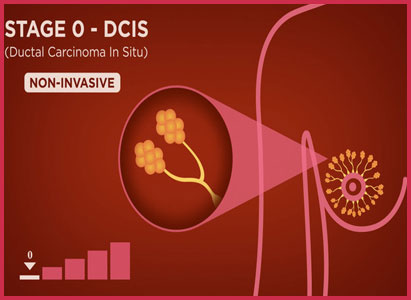
What is ductal carcinoma in situ (DCIS)?
Ductal carcinoma in situ (DCIS) is the most common type of non-invasive breast cancer. “Ductal” means that the cancer starts inside the milk ducts, “carcinoma”refers to any cancer that begins in the skin or other tissues (including breast tissue) that cover or line the internal organs, and “in situ” means "in its original place". DCIS is called "non-invasive" because it hasn’t spread beyond the milk duct into any normal surrounding breast tissue. DCIS is highly treatable and not life-threatening but if it is left untreated or undetected, it can increase the risk of developing an invasive breast cancer later on.
Signs and symptoms of (DCIS)
Ductal carcinoma in situ (DCIS) is a type of breast cancer in early stage and generally has no signs or symptoms. A small number of people may have a lump in the breast or some discharge coming out the nipple. 80% of ductal carcinoma in situ (DCIS) cases are found by mammography so it is very important for women to take a regular check-up.
Treatment for ductal carcinoma in situ (DCIS)
Surgery(modified radical mastectomy & breast reconstruction)
Open surgery is the most common treatment for breast cancer patients. Breast cancer stage 0 is still at the early stage and open surgery can remove the tumor and it has a good prognosis. However, the worst thing is a part of the breast or the entire breast will also be removed. At Modern Cancer Hospital Guangzhou, the surgeon removes the breast and carefully dissects the underarm lymph node but no muscles are removed from beneath the breast so the doctor can reconstruct the breast and keep the original shape as if it has not been removed. If you do not want to take open surgery, there are other options for the breast cancer treatment stage 0, see below.
Hormone therapy
Hormone therapy is to stop estrogen from affecting breast cancer cells. Some types of breast cancer are affected by hormones in the blood. It can be started before surgery, but it needs to continue for at least 5 years. It is also needed after open surgery as well.
The treatment plan needs to be made according to your individual condition and willingness. If you want to know what treatment options are suitable for you, you are welcome to consult with us via online consultation or call at 02-8-8221222/63-922-8083333/63-915-4642818. We are here 24/7 to answer your questions.
*Surgery, in addition to the appropriate chemotherapy and radiotherapy, are effective in treating early cancer, but certain patients in late stage of cancer may not be tolerate surgery well as they can be relatively weak. A combination of carefully planned minimally invasive therapy, chemotherapy or radiotherapy can effectively reduce the side effects and discomfort of treatment and may help patient get better efficacy.













 viber
viber